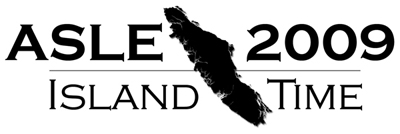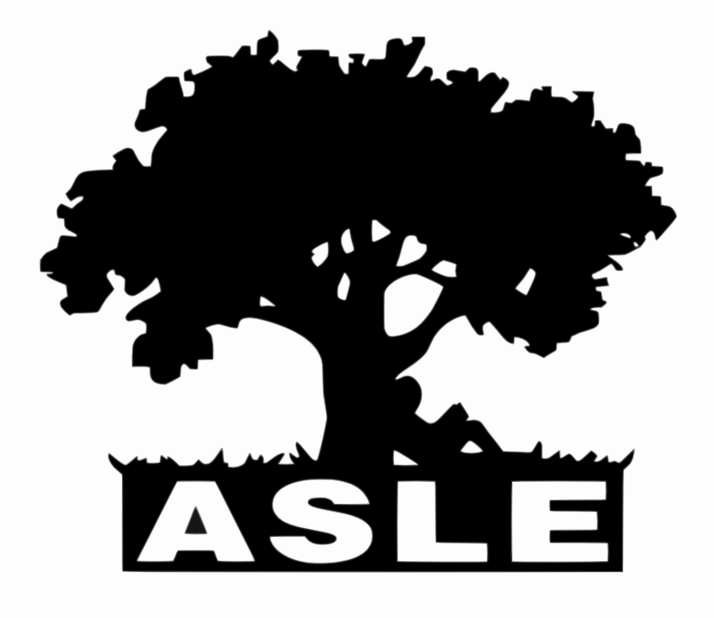
"Island Time: The Fate of Place in a Wired, Warming World"
Eighth Biennial ASLE Conference
University of Victoria, British Columbia
June 3-6, 2009
Featuring Plenary Sessions with
- Jeannette Armstrong, author of Slash and Whispering in Shadows
- H. Emerson Blake, Executive Director of The Orion Society and Editor-in-Chief of Orion
- Greg Garrard, author of Ecocriticism
- Karsten Heuer, author of Walking the Big Wild and Being Caribou
- Catriona Mortimer-Sandilands, author of The Good-Natured Feminist: Ecofeminism and the Quest for Democracy
- Ruth Ozeki, author of My Year of Meats and All Over Creation
- Richard Primack, author of Essentials of Conservation Biology and Editor-in-Chief of Biological Conservation
- Andrew Revkin, environment reporter for The New York Times
- Amy Seidl, author of Early Spring: An Ecologist and Her Children Wake to a Warming World
- Daniel Slager, publisher and CEO of Milkweed Editions
- Rita Wong, author of monkeypuzzle and forage
- Jan Zwicky, author of Songs for Relinquishing the Earth and Robinson's Crossing
and Pre-conference Workshops and Seminars on
- Animal Studies, with Linda Kalof, author of Looking at Animals in Human History, and Nicole Shukin, author of Animal Capital: Rendering Life in Biopolitical Times
- Ecological Media, with Michael Ziser and Andrew Hageman
- Graduate Studies, with Michael Branch, editor of Reading the Roots: American Nature Writing before Walden
- Habitat Studies, with Laurie Ricou, author of Salal: Listening for the Northwest Understory
- Place-based Pedagogy, with Laird Christensen and Hal Crimmel, editors of Teaching about Place: Learning from the Land
- Science Studies, with Ursula Heise, author of Sense of Place and Sense of Planet: The Environmental Imagination of the Global
The Association for the Study of Literature and Environment (ASLE) invites proposals for its Eighth Biennial Conference, to be held June 3-6, 2009, at the University of Victoria, in British Columbia, Canada, on the theme of "Island Time: The Fate of Place in a Wired, Warming World." We seek proposals for papers, panels, roundtables, workshops, and other public presentations connecting language, nature, and culture. As always, we welcome interdisciplinary approaches; readings of environmentally inflected fiction, poetry, and creative nonfiction; and proposals from outside the academic humanities, including submissions from artists, writers, practitioners, activists, and colleagues in the social and natural sciences.
This year's theme uses the conference's temporal and spatial location on Vancouver Island as a metaphor for the past and future of place generally. In particular, it reflects the fact that ASLE's first conference outside the U.S. is a fitting location to consider how the Internet and globalization now connect us all (linking our different identities, nations, and communities), as well as how the threat of climate change is affecting our interpretation of texts and cultures, not to mention the material world itself.
Building on the colloquial expression "you're now on island time," the theme suggests our interest in exploring intersecting questions of time and place, and of isolation and community, in a global era in which there are no longer any "islands" of nature outside of history and technology. Indeed, time appears to be running out as we seek ways to address ecological disasters that risk turning the planet as a whole into another "Easter Island." For this reason, we also urgently wish to consider the interconnected subjects of indigeneity, race, and social justice, in the Americas and globally, the engagement of which is crucial to achieving a sustainable society.
We are also interested in receiving proposals on the following related topics:
- island literature and life, including writing on metaphoric islands, such as protected areas, "sky islands," islands of urban and suburban nature, and environmental restorations
- place-based writing in any genre or field, including ecopoetics, ecotheater, environmental film, environmental history, landscape architecture, and cultural geography
- environmental literature as world literature, including comparative literature, cross-cultural approaches, borderlands writing, and travel writing
- literature from rooted modes of life, including forestry, fisheries, agriculture, viniculture, and apiculture
- ecocriticism, literary theory, and ecophilosophy, including post-structuralist approaches
- scientific research and writing, including the history of science
- ideas of the human, including meditations on animals and animality, the body, and disability studies
- narratives of "greening the campus," including initiatives related to recycling, transportation, and energy
- environmental rhetoric and ecocomposition
- ecopedagogy and the scholarship of teaching and learning
- undergraduate research and creative work
- the literature of environmental hope and joy
Make It Count: ASLE Responds to the Climate Crisis
At ASLE's last biennial conference at Wofford College in 2007, Bill McKibben said that if we were going to travel to a conference in a time of climate crisis, we should "make it count." We have taken this call to heart and made a number of changes to this year's conference in order to justify the costs of our collective resource use as best we can. In addition to creating as "green" a conference as possible in terms of our ecological footprint, we have attempted to create an intellectual and creative space where things can happen that would not happen otherwise. In particular, we have adapted the schedule to include more time for conversation, dialogue, and discussion in the hope that these exchanges will help to inspire creativity and innovation. These adaptions include new breakfast discussions, longer lunches, longer concurrent sessions, more time between sessions, informal discussions for attendees with special interests, a new presentation format, and several large concurrent discussion sessions for everyone at the end of the conference.
Pre-conference Workshops and Seminars on June 2
ASLE will once again offer a number of pre-conference workshops and seminars led by prominent environmental writers and critics. Each workshop and seminar will last for three hours on the afternoon of June 2 and will be limited to 15 participants. Advanced registration is required and will begin October 15 and close March 15 (or when full, whichever is earlier). Some pre-conference preparation will be required for seminars, including short position papers. Because titles of position papers will be listed in the conference program, we encourage (but will not require) seminar participants to consider attending the seminar in lieu of presenting at the conference itself (rather than doing both).
Conference Site
The University of Victoria is located on traditional lands of the Coast Salish and Straits Salish peoples in Saanich, just outside Victoria, the capital city of Canada's westernmost province, British Columbia. The region offers tremendous outdoor opportunities, from walking among the big trees of Goldstream Park, to kayaking in the Strait of Georgia, to ethnobotanical walks around the university. Social attractions include all the amenities expected of a tourist destination (including the Royal BC Museum), the city's arts community, and restaurants committed to locally produced food and drink, as well as British Columbia's well-deserved reputation for environmental activism.
The university has a wired campus, including wireless service for conference registrants, and all classrooms we will use for concurrent sessions will be equipped for computer projection and Internet access. Conference housing will be provided in the university's dormitories (traditional single and double rooms, as well as four-bedroom townhouses), while we will also have a relationship with one or more hotels in the downtown core (approximately nine kilometers from campus). Victoria's airport, about 30 minutes from campus, serves many major carriers. The city is also accessible by ferry from Tsawwassen, BC (just south of Vancouver), or from Seattle, Port Angeles, and Anacortes, Washington; attendees can choose to fly into either Seattle or Vancouver and travel more deliberately to the Island.
Field Sessions and Post-Conference Field Trips
As with past conferences, there will a number of half-day field excursions on Friday afternoon and several post-conference field trips. Among the shorter events will be a whale-watching jaunt, a cycling visit to some organic farms and orchards, a hike along East Sooke Park's Coast Trail, and time at the Quw'utsun' Cultural Centre. After the conference, the various trips will include visits to Botanical Beach, Pacific Rim National Park, the Gulf Islands (including the Heiwa Peace Park), and sites of importance for environmental activism and social justice. Volunteer opportunities are also being organized.
For Additional Information and Submission Guidelines, see http://asle.uvic.ca/
For additional information about the conference, including presentation formats, submission guidelines, biographies of plenary speakers, graduate student travel awards, and book and graduate student paper awards, see http://asle.uvic.ca/
Questions about the program? Email Dan Philippon at danp@umn.edu
Questions about the conference site and field sessions? Email Richard Pickard at rpickard@uvic.ca
All proposals must be submitted by November 15, 2008.
How to Submit
Submissions are now closed.
| |
|



